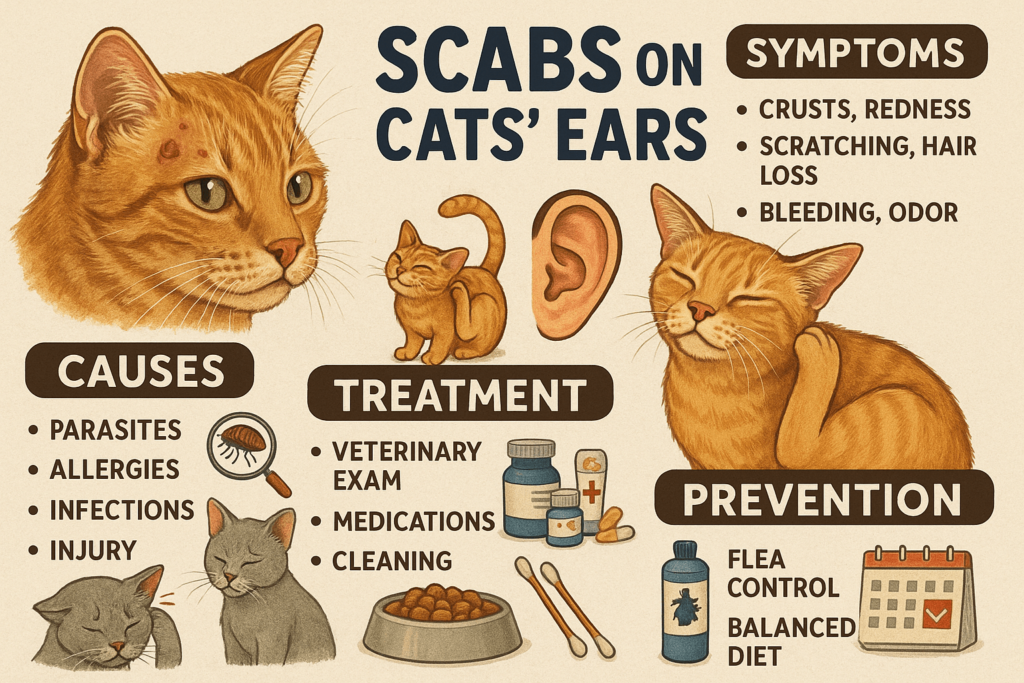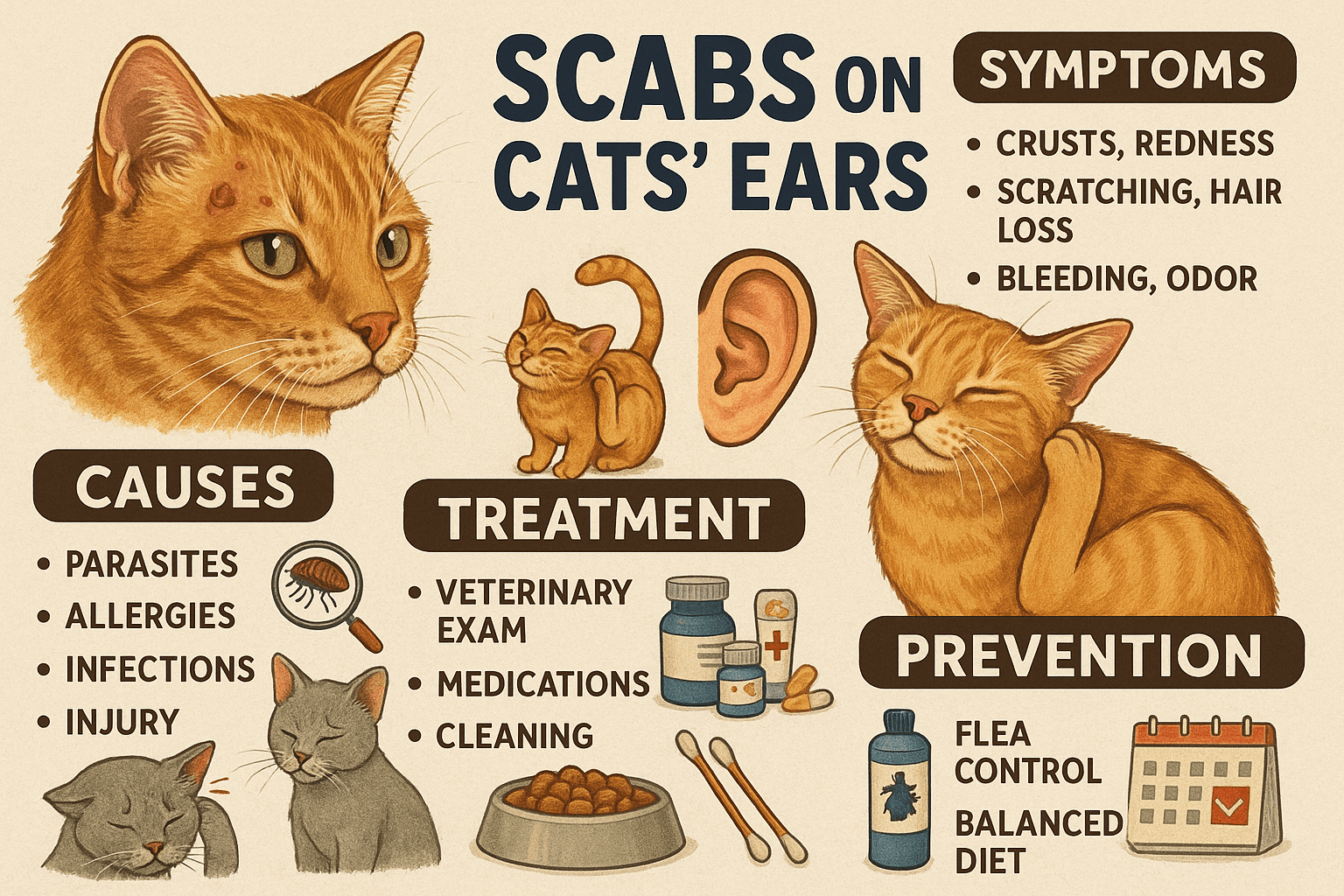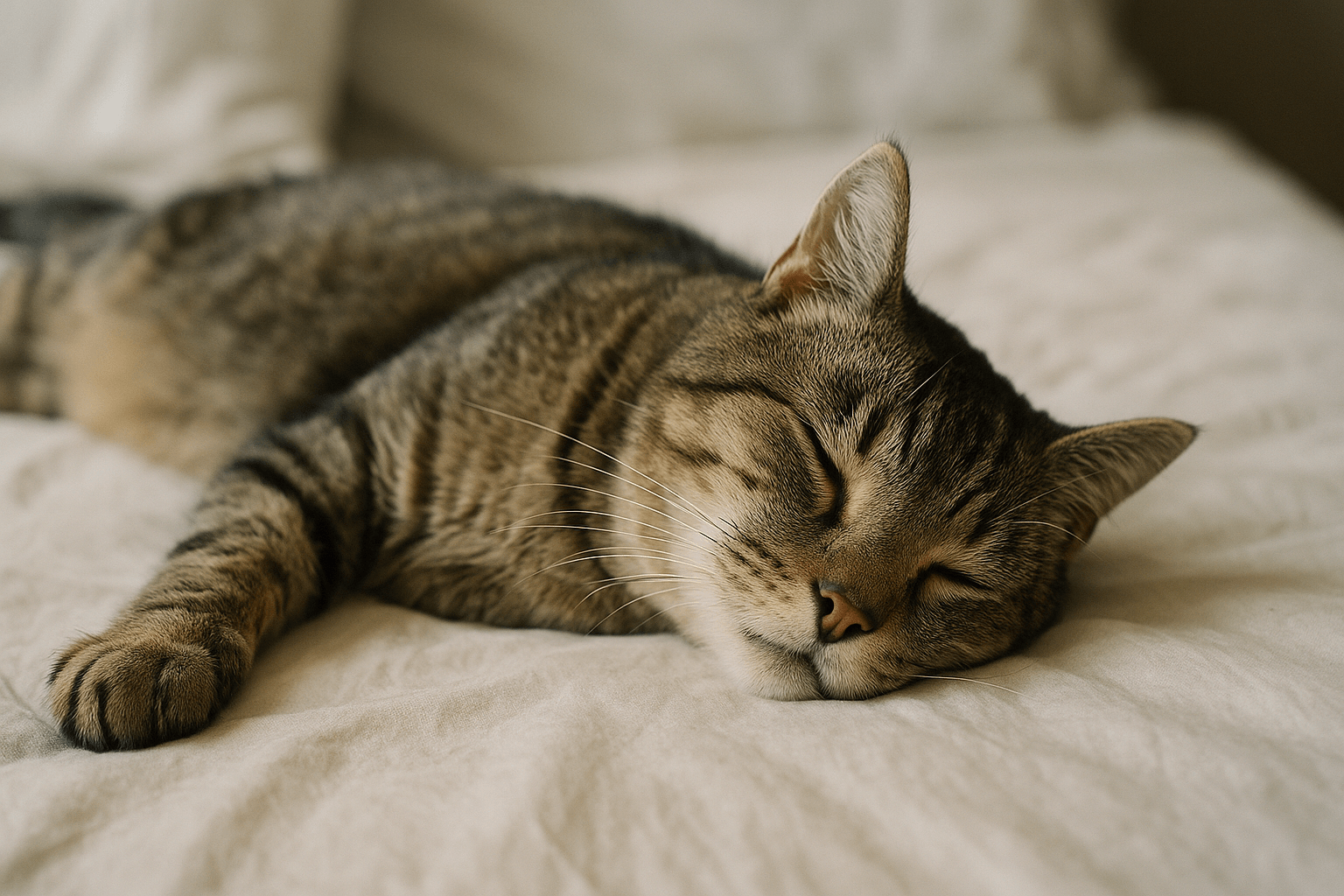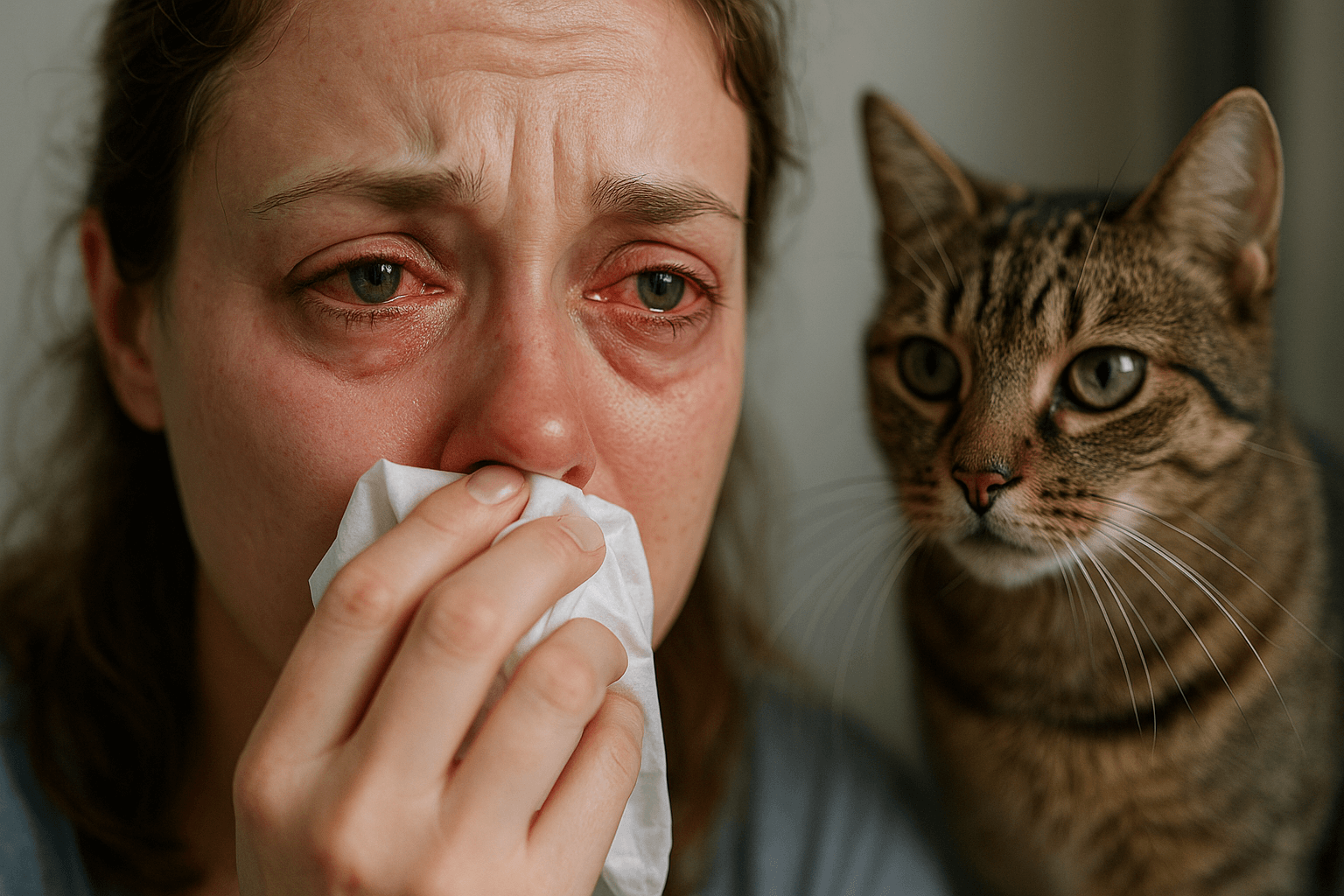Scabs on Cats Ears: Causes, Symptoms, and Solutions
If you’ve noticed scabs on your cat’s ears, it’s natural to feel concerned. These small, crusty patches can be a sign of an underlying issue that requires attention. While some causes are harmless and easily treatable, others may indicate more serious health concerns. Understanding why scabs form, how to identify potential problems, and what steps to take can help ensure your feline friend stays healthy and comfortable. In this guide, we’ll explore everything you need to know about scabs on cats’ ears, from common triggers to effective remedies.
Expert Opinion on Cat Ear Injuries
“Except for fight wounds, most ear injuries in cats are self-inflicted by scratching. This can leave the ear inflamed and scabbed, or the ear can become swollen from abscess (infection) or hematoma (blood pooled under the skin due to trauma). There are many things that can make a cat scratch this aggressively.”
— PetMD
Common Causes of Scabs on Cats’ Ears
Scabs on a cat’s ears can arise from a variety of factors, ranging from minor irritations to chronic conditions. Identifying the root cause is essential for proper treatment and prevention.
Ear Mites:
Ear mites are tiny parasites that live in the ear canal, causing intense itching and leading to scab formation as cats scratch their ears excessively.Allergies:
Food or environmental allergies can trigger skin irritation, resulting in scabs on sensitive areas like the ears.Bacterial or Fungal Infections:
Infections caused by bacteria or fungi can lead to inflammation and scabbing, often accompanied by redness and discharge.Trauma or Injury:
Scratching, biting, or external injuries can damage the delicate skin on a cat’s ears, forming scabs as part of the healing process.Autoimmune Disorders:
Conditions like pemphigus foliaceus can cause crusting and scabbing due to the immune system attacking the skin.
By pinpointing the cause, you can address the issue effectively and prevent further discomfort for your cat.

Signs Your Cat May Have Ear Issues
Recognizing the symptoms associated with scabs on cats’ ears can help you act quickly and seek appropriate care. Look out for these telltale signs.
Excessive Scratching or Head Shaking:
If your cat is constantly scratching their ears or shaking their head, it could indicate irritation or infection.Redness or Swelling:
Inflamed or swollen ear tissue often accompanies scabbing and may signal an underlying problem.Odor or Discharge:
A foul smell or unusual discharge from the ears can point to infections or parasite infestations.Hair Loss Around the Ears:
Bald patches near the ears may result from excessive scratching or rubbing against surfaces.Behavioral Changes:
Cats with ear discomfort may become irritable, lethargic, or avoid being touched around the head area.
Early detection of these symptoms ensures timely intervention and reduces the risk of complications.
Check this guide 👉Understanding Cat Ear Cancer: Best 7 Expert Tips!
Check this guide 👉Cat Ear Infection Symptoms: Best 7 Health Tips!
Check this guide 👉Swollen Cat Ear: Best 7 Expert Tips!
Preventive Measures for Healthy Ears | Treatment Options for Ear Scabs |
|---|---|
Regularly check and clean your cat’s ears | Use medicated ear drops for infections |
Keep your cat’s environment flea-free | Apply topical ointments for healing |
Provide a balanced diet to prevent allergies | Administer anti-parasitic treatments |
Schedule routine vet check-ups | Prescribe antibiotics for bacterial issues |
Avoid harsh chemicals near your cat’s ears | Use Elizabethan collars to prevent scratching |
How to Prevent Scabs on Cats’ Ears
Prevention is always better than cure when it comes to your cat’s ear health. By taking proactive measures, you can minimize the risk of scabs forming.
Regular Ear Cleaning:
Gently clean your cat’s ears with a vet-recommended solution to remove dirt and wax buildup.Flea and Tick Control:
Use preventive treatments to protect your cat from parasites that can cause itching and scabbing.Monitor for Allergies:
Observe your cat’s reaction to new foods or environmental changes, and consult a vet if allergic reactions occur.Provide a Stress-Free Environment:
Stress can exacerbate skin issues. Ensure your cat has a calm and enriching living space.Routine Veterinary Check-Ups:
Regular vet visits help catch potential problems early before they escalate into serious conditions.
By prioritizing prevention, you can keep your cat’s ears healthy and scab-free.
When to See a Veterinarian About Ear Scabs
While some cases of scabs on cats’ ears can be managed at home, others require professional veterinary care. Knowing when to seek help ensures your cat receives the appropriate treatment.
Persistent Scabs That Don’t Heal:
If scabs linger despite home care, it’s time to consult a vet for a thorough examination.Severe Itching or Pain:
Excessive discomfort or visible pain warrants immediate attention to rule out serious conditions.Unusual Odor or Discharge:
A strong smell or abnormal discharge from the ears indicates an infection that needs medical intervention.Swelling or Bleeding:
Significant swelling or bleeding around the ears requires urgent veterinary evaluation.Behavioral Changes:
Sudden lethargy, aggression, or withdrawal may signal an underlying health issue affecting your cat’s ears.
Prompt veterinary care can prevent complications and ensure your cat recovers fully.
Natural Remedies for Mild Ear Issues
For minor cases of scabs on cats’ ears, natural remedies can provide relief without resorting to harsh chemicals. However, always consult your vet before trying any alternative treatments.
Coconut Oil:
Applying a small amount of organic coconut oil can soothe irritated skin and promote healing.Aloe Vera Gel:
Pure aloe vera gel has anti-inflammatory properties that reduce redness and irritation.Chamomile Tea Compress:
A cooled chamomile tea compress can calm inflamed skin and alleviate discomfort.Apple Cider Vinegar Solution:
Diluted apple cider vinegar can help balance the ear’s pH levels and deter bacteria or fungi.Oatmeal Baths:
Adding oatmeal to your cat’s bathwater (if they tolerate baths) can relieve itchiness and inflammation.
Natural remedies can complement veterinary care but should not replace professional treatment for severe cases.
How Diet Impacts Ear Health
Your cat’s diet plays a crucial role in maintaining healthy skin and ears. Nutritional imbalances can contribute to scabs and other ear issues.
Omega-3 Fatty Acids:
Foods rich in omega-3s, like fish oil, support skin health and reduce inflammation.Hydration:
Ensuring your cat drinks enough water prevents dry skin, which can lead to irritation and scabbing.Limited Processed Foods:
Avoid feeding your cat highly processed foods that may contain allergens or artificial additives.Balanced Nutrition:
A diet tailored to your cat’s age, breed, and activity level promotes overall wellness, including ear health.Identify Food Allergies:
Work with your vet to identify and eliminate potential food allergens triggering ear problems.
A nutritious diet strengthens your cat’s immune system and minimizes the risk of scabs forming.
Importance of Early Intervention
Addressing scabs on cats’ ears early can prevent complications and save your cat from unnecessary discomfort. Timely action makes all the difference in managing ear issues effectively.
Prevents Secondary Infections:
Treating scabs promptly reduces the risk of bacteria or fungi worsening the condition.Minimizes Discomfort:
Early intervention alleviates itching and pain, improving your cat’s quality of life.Avoids Chronic Conditions:
Untreated scabs can lead to recurring or chronic ear problems, requiring long-term management.Saves Time and Money:
Addressing issues early often involves simpler treatments compared to advanced cases.Strengthens the Bond with Your Cat:
Taking quick action demonstrates your commitment to your cat’s well-being, strengthening your relationship.
Proactive care ensures your cat remains happy, healthy, and free from persistent ear troubles.
Frequently Asked Questions About Scabs on Cats’ Ears
What causes scabs on my cat’s ears?
Scabs can result from ear mites, allergies, infections, trauma, or autoimmune disorders.
Can I treat ear mites at home?
Yes, over-the-counter treatments are available, but consulting a vet is recommended for proper diagnosis.
How do I clean my cat’s ears safely?
Use a vet-approved ear cleaner and gently wipe the outer ear with a cotton ball—avoid inserting anything into the ear canal.
Are scabs on cats’ ears contagious?
If caused by parasites like ear mites, the condition can spread to other pets, so prompt treatment is essential.
How long does it take for scabs to heal?
Healing time varies depending on the cause, but most scabs improve within 1-2 weeks with proper care.
Keeping Your Cat’s Ears Healthy and Scab-Free
Scabs on cats’ ears may seem alarming, but with the right knowledge and care, you can address the issue confidently. Whether caused by parasites, infections, or allergies, understanding the underlying cause is key to effective treatment. By staying vigilant, practicing preventive measures, and seeking veterinary advice when needed, you can ensure your cat enjoys optimal ear health and overall well-being. Remember, a happy cat starts with attentive care—and that includes keeping their ears in tip-top shape.
Why Is My Cats Second Eyelid Showing? Best 7 Expert Tips! Understand causes, health signs, and how to respond when your cat’s third eyelid becomes visible.
How Do I Know If My Cat Died Peacefully? Best 7 Expert Tips! Discover the quiet signs of a peaceful feline passing and find comfort in their final moments.
Cat Allergy Eyes: Best 7 Expert Tips! Discover why your eyes react to cats and learn proven strategies for relief—without giving up your feline friend.
Why Do Abyssinian Cat Colors Matter? Best 7 Expert Tips! Discover the genetics, rare hues, and care secrets behind Abyssinian coat colors for a healthier, happier cat.





